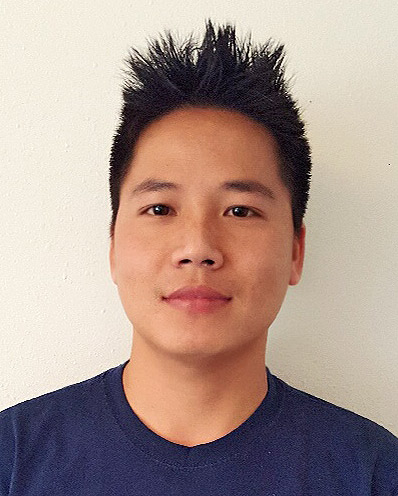After 9 years in refugee camp, Burmese immigrant wants to give back
December 2nd, 2015 Posted in Arts and LifeBy Morgan Pratt
LOGAN — If you check out Chapter Doh on social media, he seems like your typical Utah State University computer science student. His Facebook wall is filled with selfies of him in USU T-shirts with spiky hair, attending Aggie football games.

Chapter Doh
If you browse farther back on his timeline, you will discover he is a returned missionary for the Church of Jesus Christ of Latter-day Saints. He loves to talk, is smart, and he is dedicated to his education.
But Doh is much more than your ordinary college student; he spent nine years of his life in a refugee camp in Thailand, and is a refugee who was relocated to Utah in 2009.
“A lot of people came here for school, but I came here as a refugee because my country had a civil war and I had to escape,” he said.
Doh will return to the Thai-Burma border on Christmas Day to take money and school supplies to a school called Teseker in a refugee camp.
He is among an estimated 50,000 refugees who live in Utah, with an another estimated 1,000 more coming each year, according to Refugee Community Liaison Chelsea Eddy.
Utah receives a variety of refugees from the Thai-Burma border, including the ethnic Karen, Karenni, Burmese and Rohingya, which is a Muslim ethnic group. Each group has unique languages, culture and heritage.
“They usually vary on language and culture and where in the country they are from and their ethnicity,” Eddy said.
Doh, who is Karenese, spent his formative years — from 10 to 19 — in a refugee camp in Thailand after he fled violence caused by a civil war in Myanmar when he was 10. “They were trying to kill us,” he said. “I ran away from my place and then I went to my aunt’s house and I ran with her into the jungle to escape for my life.”
After that, he lived in a refugee camp in Thailand for nine years under the care of his aunt and uncle.
“I haven’t seen my family since I was 10,” he said. “But when I was in the refugee camp I didn’t have any access or a letter or anything. My parents didn’t have anything, so we could not communicate to each other.”
But as a refugee in Thailand, communication with his parents was the least of Doh’s problems.
Living as an undocumented refugee at in a camp in Thailand meant he could not legally leave the camp for any reason, which was a strict rule that was enforced by a barbed wire fence.
“A refugee camp to me is a prison,” he said. “I could not leave.”
The United Nations was in charge of the refugees on the Thai-Burma border. They designated specific places for the each person to live and provided the refugees with basic necessities, including food, shelter and water, so they had no reason — or excuse — to leave the camp.
Doh said people would escape the refugee camp in search for food, because there was often not enough protein in the meals the United Nations provided.
“Whenever they did, they got arrested by the security guards and they would get beat up really bad and they would just send them back to the camp,” he said.
Doh was relocated in 2009 to Salt Lake City, and moved to Logan a month later.
“Pretty much, Logan is home to me,” he said. “But I didn’t want to go to Logan at first because I didn’t know what Logan was.”
While Salt Lake City is the only designated resettlement city in Utah, Cache Valley is a hub for many refugees, said Luz Carreno, an AmeriCorps Vista for the Cache Refugee and Immigrant Connection. One reason is that newly migrated refugees typically want to live near their friends and families. Another reason is that there are a lot of jobs in Cache Valley, particularly at the JBS beef packing plant in Hyrum.
“Back in 2006, there was a raid and a lot of undocumented immigrants were deported, so that opened up jobs,” Carreno said. “Usually the starting wage is around $12 to $14 an hour. It is hard compared to other jobs, but it helps to support families.”
Since moving to Cache Valley, Doh has joined the LDS church, served a Mormon mission in Los Angeles, received his GED and now is a student at USU.
“Why not Utah State?” he said, laughing.
Doh said he has always wanted to further his education, but he didn’t have the chance to go to college in the refugee camp, so he said he was glad when he emigrated to the United States.
He doesn’t go to school to become rich or famous, Doh said. He has one goal in mind. “I hope someday that I can go back to my country and teach or be a teacher or a professor,” he said. “It is part of my goal to go back home and help people back home someday.”
TP
Tags: Burma, Cache Valley immigrants, Chapter Doh, refugees, Southeast Asia, Thailand

2 Responses to “After 9 years in refugee camp, Burmese immigrant wants to give back”
By Elizabeth Moltzau on Dec 4, 2015
I am glad and proud of him. I also have the same background and lived 17 years in refugee camp, Burma and Thailand border. In 2007, we immigranted to Norway.
By Katie Jensen on Dec 5, 2015
I have known Chapter since shortly after he arrived in the U.S. He is the most amazing person. He has accomplished so much already after starting out in such terrible circumstances. Chapter has spent countless hours helping other refugees to assimilate into our community. I am proud to consider him a part of my family. He is loved by so many people!!